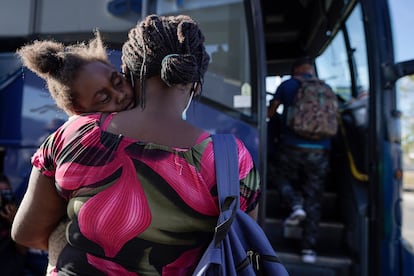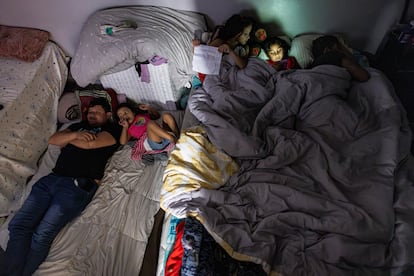Legal status revoked, jobs gone from one day to the next: ‘I don’t know how I’m going to survive’
After the Trump administration canceled humanitarian parole for around 530,000 Cuban, Haitian, Nicaraguan and Venezuelan migrants, work permits were next to follow

On Monday morning, Paola received word that she’d been let go from her job. She’d been working for two months in a position at a meat processing facility in the Texas town where she lives. She started there because they offered a better salary than at her previous restaurant position. She’d learned the ropes, and packed the product quickly and efficiently. It wasn’t her dream job, but it wasn’t that bad. She and her two children, who arrived in the United States 10 months ago on the humanitarian parole program, had been able to survive on her earnings.
“I got up early to get ready, but my little girl began to vomit. I called to tell them I’d be in late. I took her to the doctor and then dropped her off at school,” says Paola, a 37-year-old Cuban who prefers not to share her real name. A few hours later, she got a phone call in which they told her not to come in for her shift because her work permit had expired. “It was terrible news. I was suffering over have to miss a few hours, and I lost the whole job.”
That Monday, workplaces across the country received notification from U.S. Citizenship and Immigration Services that there had been changes made to the status of humanitarian parole beneficiaries. The program had been implemented by the Biden administration for people coming from Cuba, Haiti, Nicaragua and Venezuela. According to the statement, the work permits that had been emitted through the program would expire on April 24, along with other benefits. But many of the permits were already showing up as having been revoked. Paola knows this because it was the explanation she received at her appointment with the Department of Homeland Security as to why she could not complete her application for a driver’s license. “They asked me if I had a newer permit, and since I didn’t, they didn’t allow me to get the license, because I was using the permit as my identification,” she says.
“Right now, I’m thinking about how to provide for my family. I’ve considered making candy or food for home delivery. Making some kind of craft, I don’t know,” says Paola. She’s also concerned that her children’s school vacations start on May 23. “They’re going to be in the house more, they won’t be getting fed at school, my expenses will go up because of it. I have to do something. Also, my mother and my grandmother in Cuba are depending on me to survive.”

“What makes me feel most powerless is that we’ve always tried to do things the right way. I told myself, ‘If I can’t do it legally, I’m not leaving [Cuba] with my children.’ And we came legally. We did it all the right way, we don’t deserve to be in this situation now,” Paola says. When asked about the option of returning to her birth country, she says that she’d end up in prison and that there, her “children will have no food or electricity to do their homework, they won’t have a pair of shoes or any clothes, because that’s how they live there. No matter how bad I feel here right now, no matter how difficult the situation is, returning is not an option for us.”
Elizabeth, another Cuban who asks to withhold her real name and who is 25 years old, also had to turn around and go home when she was in the middle of driving to her factory job that Monday. “I was going to start at two in the afternoon. The department of human resources called me at 1:50 p.m. to say that they’d gotten a letter saying that my work permit had been revoked and that I couldn’t keep working there,” she says. Elizabeth came to the United States last June, after she was able to successfully apply for humanitarian parole with the help of her father. Since then, she has had several jobs and has dedicated herself to saving as much as possible with the idea of reuniting with her mother, who still lives on the island.
She says that last week, she received a letter from USCIS inviting her “courteously, to leave the country in April.” “I’m not going anywhere, but I did think I’d be able to work at least for one more day,” she says. On Monday morning, after seeing on social media that they had started to cancel the permits of people who were in a similar situation, she called her job to ask if she should come in or not. “They said that they hadn’t received any letter and that I could keep working, and when I was on the way, they made me turn back.”
After they’ve been in the United States for a year and a day, Elizabeth and Paola will be able to apply for their residency and work permit through the Cuban Adjustment Act. But that application can drag on for months, and neither one knows how they would be able to survive in the interim. “Clearly, I’m afraid. I’m in a situation in which I don’t know what to do. For now, I’m thinking about doing Uber Eats using my boyfriend’s account. And try to get by on that, until I find something better.”
Sign up for our weekly newsletter to get more English-language news coverage from EL PAÍS USA Edition
Tu suscripción se está usando en otro dispositivo
¿Quieres añadir otro usuario a tu suscripción?
Si continúas leyendo en este dispositivo, no se podrá leer en el otro.
FlechaTu suscripción se está usando en otro dispositivo y solo puedes acceder a EL PAÍS desde un dispositivo a la vez.
Si quieres compartir tu cuenta, cambia tu suscripción a la modalidad Premium, así podrás añadir otro usuario. Cada uno accederá con su propia cuenta de email, lo que os permitirá personalizar vuestra experiencia en EL PAÍS.
¿Tienes una suscripción de empresa? Accede aquí para contratar más cuentas.
En el caso de no saber quién está usando tu cuenta, te recomendamos cambiar tu contraseña aquí.
Si decides continuar compartiendo tu cuenta, este mensaje se mostrará en tu dispositivo y en el de la otra persona que está usando tu cuenta de forma indefinida, afectando a tu experiencia de lectura. Puedes consultar aquí los términos y condiciones de la suscripción digital.








































